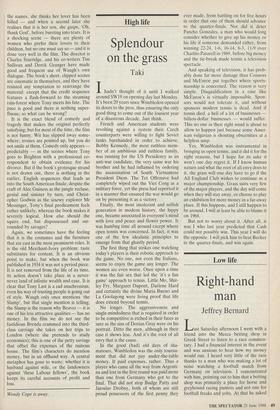High life
Splendour on the grass
Taki
Ihadn't thought of it until I walked around SW19 on opening day last Monday. It's been 20 years since Wimbledon opened its doors to the pros, thus ensuring the only good thing to come out of the lousiest year of a disastrous decade. Just think.
French and American students were revolting against a system their Czech counterparts were willing to fight Soviet tanks barehanded in order to achieve. Bobby Kennedy, the most ruthless mem- ber of an ambitious and ruthless family, was running for the US Presidency as an anti-war candidate, the very same war his brother and he had inflamed by ordering the assassination of South Vietnamese President Diem. The Tet Offensive had completely wiped out the Viet Cong as a military force, yet the press had reported it in a manner that ensured the war would go on by presenting it as a victory.
Finally, the most intolerant and selfish generation in modern history, the hippy one, became associated in everyone's mind with love and peace and flower power. It was humbug time all around except where open tennis was concerned. In fact, it was one of the few idealistic principles to emerge from that ghastly period.
The first thing that strikes one watching today's players is their robotic approach to the game. No one, not even the Italians, seems to enjoy the game any longer. The women are even worse. Once upon a time it was the fair sex that led the 'it's a fun game' approach to tennis. Little Mo, Shir- ley Fry, Margaret Dupont, Darlene Hard and certainly the divine Maria Bueno and La Goolagong were living proof that life does extend beyond tennis.
No longer. The aggressiveness and single-mindedness that is required in order to be competitive is etched in their faces as sure as the sins of Dorian Gray were on his portrait. Ditto the men, although in their case it shows less. And it's the root of all envy that is the cause.
In the good (bad) old days of sha- mateurs, Wimbledon was the only tourna- ment that did not pay under-the-table money. It paid expenses, rather. Thus a player who came all the way from Argenti- na and lost in the first round was paid more than one from Germany who got to the final. That did not stop Budge Patty and Jaroslav Drobny, both of whom are still proud possessors of the first penny they ever made, from battling on for five hours in order that one of them should advance to the quarter-finals. Nor did it deter Pancho Gonzales, a man who would long consider whether to give up his money or his life if someone demanded either, from winning 22-24, 1-6, 16-14, 6-3, 11-9 over Charlito Pasarell in 1969, before big money and the tie-break made tennis a television spectacle.
And speaking of television, it has prob- ably done far more damage than Connors and McEnroe put together where sports- manship is concerned. The reason is very simple. Disqualification in a case like McEnroe's is virtually impossible. Spon- sors would not tolerate it, and without sponsors modern tennis is dead. And if tennis died, a hell of a lot of businesses billion-dollar businesses — would suffer. This no one in their right mind is about to allow to happen just because some Amer- ican vulgarian is shouting obscenities at a helpless ump.
Yes, Wimbledon was instrumental in bringing us open tennis, and it did it for the right reasons, but I hope for its sake it won't one day regret it. If I know human nature and what the root of all envy does to it, the grass will one day have to go if the All England Club wishes to continue as a major championship. Grass suits very few of the major players, and the day will come when they will stay away, or choose to play an exhibition for more money in a far-away place. If this happens, and I still happen to be around, I will at least be able to blame it on 1968.
But not to worry about it. After all, it was I who last year predicted that Cash could not possibly win. This year I will do the opposite. I will pick him to beat Becker in the quarter-finals, and win again.










































































 Previous page
Previous page